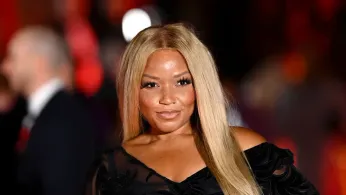
6 hours ago
Marisha Wallace Shines in ‘Cabaret’ After Facing Racist Barriers: “I Was Told I Was Too Black to Lead a Show”
READ TIME: 3 MIN.
Marisha Wallace, the two-time Olivier Award nominee, stepped into the iconic role of Sally Bowles in the Tony-nominated revival of “Cabaret” at Broadway’s Kit Kat Club (August Wilson Theatre) on July 22, 2025. She stars alongside Tony winner Billy Porter, who brings his own celebrated presence as the Emcee, with both performers reprising their acclaimed roles from the West End. The production, directed by Rebecca Frecknall, is lauded for its immersive staging and queer-forward vision, with set and costume design explicitly celebrating queer individuality on and off stage .
In a candid interview, Wallace revealed the racism she faced on her journey to Broadway stardom, including being told she was “too Black” to lead a major show. “This is what the fascists want. They want you to eat each other alive. They want to divide and conquer. I think unity is the way we beat these people. This is how we win. They love to see us in-fighting. They love it! Come on now,” Wallace stated, reflecting on the wider implications of division and the importance of solidarity in the face of discrimination .
Wallace’s remarks come at a time when the theater industry continues to grapple with issues of racism and representation. While Broadway has made strides in diversity, performers of color, including those who are LGBTQ+, often encounter unique barriers to leading roles in major productions. Wallace’s ascent to the lead in “Cabaret” confronts these historic exclusions directly, offering both visibility and hope for future generations of marginalized artists .
The current revival of “Cabaret” is notable for its deliberate celebration of LGBTQ+ identity. Both Wallace and Porter—out and proud in their identities—bring new layers of meaning to their characters. Porter’s return to Broadway after nearly a decade and Wallace’s long-overdue recognition as a leading lady are seen as emblematic of the progress being made in the industry .
The creative team, which features choreographer Julia Cheng and designers Tom Scutt, Isabella Byrd, and Jennifer Whyte, has transformed the theater into an in-the-round Kit Kat Club, creating an immersive experience that draws the audience into the world of Weimar Berlin. Ticket holders are invited to enter the club before the show for a pre-show performance, further blurring the lines between performer and spectator .
Wallace’s casting—and her willingness to speak openly about racism—has been widely embraced by LGBTQ+ communities and allies. Her journey from understudy to leading lady in both the West End and Broadway is a testament to the resilience of Black women in theater and the necessity of fostering spaces where all LGBTQ+ identities can thrive.
The dialogue around representation in “Cabaret” took on additional complexity after comments from Porter sparked debate about the intersections of race, antisemitism, and queer identity. Wallace affirmed the integrity of the show’s original characters and called for unity in the face of attempts to divide marginalized communities. “Obviously, the Blacks are not replacing the Jews. The lines, the people and the characters are all still there. You have to ask him about what he said, but in the show, all the characters are the same,” she explained .
Wallace’s performance has been met with enthusiastic acclaim, with critics and audiences alike praising her electrifying rendition of “Maybe This Time” and her dynamic stage presence . Her success is not only a personal milestone but also an important cultural moment for Black queer women and for all who seek greater equity in the performing arts.
As the production enters its final months before closing on October 19, 2025, Wallace and Porter’s performances stand as powerful reminders of the ongoing work needed to ensure Broadway—and the wider entertainment industry—reflects the full diversity and richness of the LGBTQ+ community .






